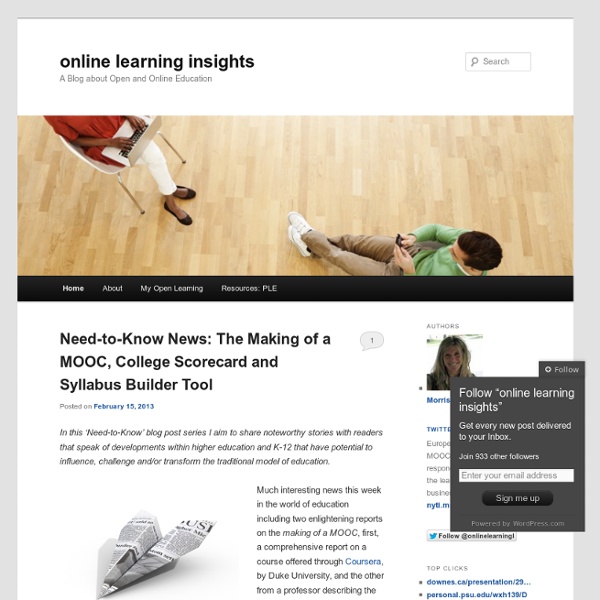



http://onlinelearninginsights.wordpress.com/
Research for Practitioners: Can Text Messages (SMS) Support Learning? by Clark N. Quinn “We too often neglect meta-learning (learning to learn) strategies in our approaches. Having support for these strategies, in addition to all else we do for our learners, is likely to increase the learning outcomes.” Do you take the time to read through examples provided in learning experiences and explain to yourself why the author took each step? The most successful learners do. Open and Closed The voice belongs to Cody Wilson, a law student in Texas who last year founded Defense Distributed, a controversial initiative to produce a printable “wiki weapon.” With Defcad, he is expanding beyond guns, allowing, say, drone enthusiasts to search for printable parts. Mr. Wilson plays up Defcad’s commitment to “openness,” the latest opiate of the (iPad-toting) masses. Not only would Defcad’s search engine embrace “open source” — the three-minute trailer says so twice — but it would also feature “open data.” With so much openness, Defcad can’t possibly be evil, right?
MindShift MindShift explores the future of learning in all its dimensions. We examine how learning is being impacted by technology, discoveries about how the brain works, poverty and inequities, social and emotional practices, assessments, digital games, design thinking and music, among many other topics. We look at how learning is evolving in the classroom and beyond.We also revisit old ideas that have come full circle in the era of the over scheduled child, such as unschooling, tinkering, playing in the woods, mindfulness, inquiry-based learning and student motivation. We report on shifts in how educators practice their craft as they apply innovative ideas to help students learn, while meeting the rigorous demands of their standards and curriculum.
Improving Professional Practice:Moving to Evidence-Based Professional Practice Schools have recently begun to place increased emphasis on the use of rigorous research evidence in guiding instructional decisions. These efforts have been partly inspired by the No Child Left Behind Act's insistent call for the use of “scientifically based” research. As educators, however, we are driven by a much more powerful force than legislative mandates: We sincerely want to know that our actions will help students succeed. How can we harness the power of scientific research on behalf of the students we serve? What We Know Turning education into an evidence-based field is easier to advocate than to achieve, particularly in an environment of competing claims about what works.
Education in “Present Shock” : An interview with Douglas Rushkoff Note: An mp3 of this interview is available for download. I recently had the pleasure of speaking with award-winning author, educator, and documentarian Douglas Rushkoff. Our discussion focused on his new book “Present Shock: When Everything Happens Now,” his advisory role at Codecademy, and the impact of Present Shock on education. Education Futures: Douglas, you have a new book out called “Present Shock: When Everything Happens Now.” Learning Journal I was tasked this week with creating a digital profile; what type of digital profile and how much to disclose or not to disclose was our choice. However, our choices were to be explained and supported. My response:
Clay Shirky Fifteen years ago, a research group called The Fraunhofer Institute announced a new digital format for compressing movie files. This wasn’t a terribly momentous invention, but it did have one interesting side effect: Fraunhofer also had to figure out how to compress the soundtrack. The result was the Motion Picture Experts Group Format 1, Audio Layer III , a format you know and love, though only by its acronym, MP3. The recording industry concluded this new audio format would be no threat, because quality mattered most. Who would listen to an MP3 when they could buy a better-sounding CD at the record store? Then Napster launched, and quickly became the fastest-growing piece of software in history.
Fundamentals of Online Education: Planning and Application In this course you will learn about the fundamentals of online education. The emphasis will be on planning and application. In the planning phase, you will explore online learning pedagogy, online course design,privacy and copyright issues, online assessments, managing an online class, web tools and Learning Management Systems. In the application phase, you will create online learning materials.
Online Education and the Virtual Classroom Sometimes the best inventions happen by accident. One of the world's great storehouses of biological knowledge is the Animal Diversity Web. In 1995, University of Michigan biology professor Philip Myers decided to use the new medium of the World Wide Web to engage his students in producing the textbook he thought his course needed but did not exist. The tasks of researching, writing, checking, and posting information about animal species and their habitats could, Myers reasoned, not only teach students about animal diversity but also help them better understand the science involved. He was right. What he had not foreseen, however, was that ADW would spawn a set of overlapping worldwide communities.